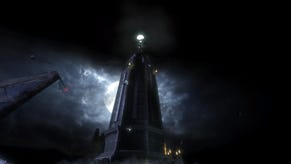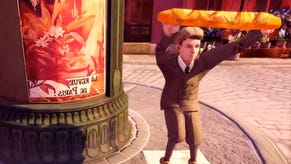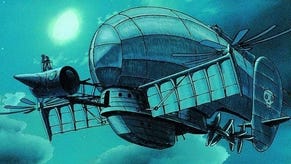BioShock Infinite
The shock of the old.
Whether or not you think of BioShock Infinite as the true sequel to BioShock probably depends on your definition of the word sequel. We've already had a numerical and chronological successor set in the drowned world of Rapture, of course, echoing its pressured, clanking undersea horror and iconic art deco imagery.
BioShock Infinite catapults us backwards - and upwards - to a very different world. It's 1912, and we're in Columbia, another failed utopia. But this one is a city flying high in the clouds: islands of whitewashed brick and mortar kept aloft by airship envelopes and giant propellers, studded with trees, connected by a tangle of sky lines, bathing in bright summer sunlight. What happens there seems faster, more spectacular, more overtly fantastical - and more personal.
It's not explicitly set in the same universe as BioShock. It looks and feels very different - and yet strangely familiar. Columbia is largely deserted and collapsing around you, thinly populated by unpredictable people with strange powers. There are faded posters done in immaculate period style, shouting about lost ideals and brands that never were. The soundtrack is defined by the scratch of needle on acetate. And there's that sense of exploring a world that you almost recognise but is also utterly new to you - the sense that defined BioShock but that - by definition - was beyond BioShock 2.
That will make Infinite, in the eyes of many, the true BioShock sequel. That, and the fact that it's being made by Irrational Games and masterminded by its founder Ken Levine.
Levine's on stage in an elegantly chandeliered function room of the Plaza Hotel in New York, an imposing chunk of faux-château that was built in 1907 and perfectly encapsulates the bold spirit of 1900s America that he's talking about. (Later, the black drapes around us will fall away to reveal a 360-degree panorama of Columbia on the walls, suspending us in Infinite's new sky world. Well, almost all the drapes fall away - some stubbornly cling on for a minute, emitting awful mechanical coughs. It spoils Levine's big moment a little, but adds a touch of broken hubris that's somehow very BioShock.)
After showing us the first trailer, Levine explains that Columbia was built at the turn of the century, not in secret like Rapture, but as a very public expression of the economic and engineering might of a nation that had gone from rural backwater to industrial powerhouse in a couple of decades: "the Apollo project of 1900," as he puts it. Ostensibly a peaceable metropolis built in the founding-fathers, neo-classical style of Irrational's home town of Boston, Columbia turns out to be "a Death Star" that's armed to the teeth, becomes involved in a catastrophic and violent international incident, and then disappears.
In a break with Shock tradition, the player is no nameless cipher but a pronounced character in Infinite's story: a Pinkerton agent, a disgraced strike-breaker and strong-arm, rejoicing in the name Booker DeWitt. A mysterious figure who knows Columbia's location employs him to find and rescue Elizabeth, a woman with strange and immense powers who's imprisoned there. DeWitt finds her without difficulty, but Elizabeth is embroiled in a conflict that's tearing Columbia apart, and the pair must combine their powers and form a partnership to escape the city as it crumbles away beneath their feet. (Elizabeth is strictly an AI companion: you won't be controlling her in a co-op mode.)













.png?width=291&height=164&fit=crop&quality=80&format=jpg&auto=webp)




.jpg?width=291&height=164&fit=crop&quality=80&format=jpg&auto=webp)
